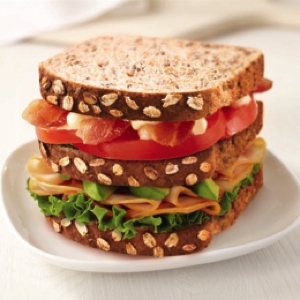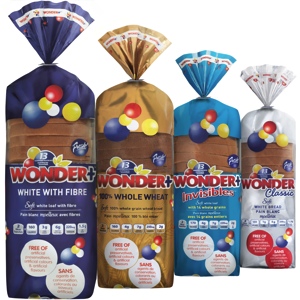
Out with the bad, in with the good
By Carol Neshevich
Food Trends Bake & Snack Food Health & Wellness baked goods bread healthy foods snacksAlthough the baked goods and snack sectors have traditionally gotten a bad rap when it comes to health and nutrition, many Canadian food companies are working hard to change that reputation
As featured in the January/February 2012 issue of Food in Canada
Cookies have too much sugar, chips are too salty and greasy, and all those carbs in bread are sure to make you fat. Sound familiar? These are the kinds of stereotypes that countless foods in the baked goods and snack sector have long been up against. But these days, Canadian food companies are working hard to alter that reputation and make their bake and snack products “better for you.” They’re doing this both by reducing the “bad” content – such as salt, sugar, artificial additives and fat – and increasing the “good,” adding nutrients, vitamins, fibre and more.
The challenge? Consumers still want their chips, cookies, cakes, crackers and bread products to be just as delicious as ever. It’s a “have your cake and eat it too” mindset in which consumers refuse to compromise on taste, but want a healthier option wherever possible. This is where the hard work comes in for product developers.
Shaping up
Toronto, Ont.-based Kraft Canada has been working hard to meet the demand, according to Irene Daley, a senior product manager for the company. “Over the  last few years, we’ve made changes to more than one-third of our products in Canada,” she says. “And we’re making these changes by improving nutritional profiles, such as reducing sodium; by adding beneficial ingredients like fruit, antioxidants and whole grains; and through cleaner ingredient lines by removing artificial colours, flavours and preservatives.”
last few years, we’ve made changes to more than one-third of our products in Canada,” she says. “And we’re making these changes by improving nutritional profiles, such as reducing sodium; by adding beneficial ingredients like fruit, antioxidants and whole grains; and through cleaner ingredient lines by removing artificial colours, flavours and preservatives.”
Daley points to Kraft’s Peek Freans Lifestyle Selections line of cookies as a great example of a better-for-you snack developed by the company in recent years. “They come in a variety of unique flavour combinations, while delivering additional benefits like fibre, calcium, omega-3 or ‘no sugar added,’ and they have the same great taste Canadians love about Peek Freans,” she says. In the cracker segment Kraft has worked on its Triscuit brand “and we now offer a 61-per-cent less sodium option and a 40-per-cent less fat variety.” It seems consumers are responding well to these types of snacks – although Daley wasn’t willing to share specific numbers, she says the low-sodium Triscuit “is one of our top three performing Triscuit varieties,” and notes that the Peek Freans Lifestyles selections “have seen double-digit growth.”
Potato chip companies are rising to the better-for-you challenge as well. Like many chip manufacturers today, Winnipeg, Man.-based Old Dutch Foods Ltd. offers a baked chip line that has a much lower fat content than a traditional fried potato chip. Scott Kelemen, national director of Marketing for Old Dutch, says the company has put a lot of effort into making the baked product appealing to consumers, and not just as a healthier but less-exciting alternative to “real” chips. “In the past, if you go back several years, the healthier options weren’t as exciting,” says Kelemen. “Baked snacks used to be pretty dull, pretty boring. But to be honest, I think a lot of them weren’t really developed to compete with mainstream items. So several years ago we decided to bring mainstream appeal to the baked category and to price them accordingly as well, so that they weren’t something that was seen as a really expensive and boring option for people’s snacking occasions.”
Noting that “they’re a different taste profile,” Kelemen admits that a baked chip won’t taste exactly the same as a traditionally made potato chip, due to the different manufacturing processes. But he says Old Dutch has worked hard to modify the types and amounts of seasonings on the chips to make sure the baked product tastes great, and that the flavourings taste approximately the same in a baked chip as compared to its mainstream chip counterpart.
Revamp and revitalize
 Old Dutch isn’t just focusing its health efforts on the baked products – the company has also made numerous health-related changes to its traditional mainstream potato chip. “We’ve been actively reducing sodium for the past two years in our mainstream items,” says Kelemen, adding that the company’s “lightly salted” line of chips is selling extremely well. The company is also working to reduce artificial flavourings wherever possible. For example, Kelemen says the Dutch Crunch Jalapeno and Cheddar chips, “have natural jalapeno flavouring now, whereas it would have been artificial several years ago. It’s a more expensive option, but we feel it’s the way to go.”
Old Dutch isn’t just focusing its health efforts on the baked products – the company has also made numerous health-related changes to its traditional mainstream potato chip. “We’ve been actively reducing sodium for the past two years in our mainstream items,” says Kelemen, adding that the company’s “lightly salted” line of chips is selling extremely well. The company is also working to reduce artificial flavourings wherever possible. For example, Kelemen says the Dutch Crunch Jalapeno and Cheddar chips, “have natural jalapeno flavouring now, whereas it would have been artificial several years ago. It’s a more expensive option, but we feel it’s the way to go.”
When retooling the formulation of a traditional product, Kelemen says it’s crucial to carefully test the product with consumers before putting them on the shelves. “People have been buying our product for over 50 years in the Canadian market, and we don’t want to turn people off by changing the taste profiles. So we’ve been running triangle taste panels [a consumer taste test method] to ensure people don’t notice the difference in our move to reduce sodium and go more natural on our seasonings.”
Breads have a similar challenge, although the issues are slightly different. Bread has been somewhat vilified since the 1990s, when low-carb diets were the fashion and carbohydrates came to be seen as fattening. Yet on the upside for the bread industry is the fact that fibre and whole grains are currently being touted as crucial for good health and nutrition.
“Obviously there’s been [bad] media around carbs, but we feel that the new trend for 2012 seems to be about including carbs in your diet, because registered dieticians are saying that eliminating any entire food group isn’t great for a long-term healthy solution,” says KC Shendelman, senior marketing director, Meal Occasions and Innovation, for Etobicoke, Ont.-based Canada Bread Company Ltd. “But it’s about having the right carbs – leafy vegetables, fruits, legumes and whole grains.”
Canada Bread’s Dempster’s brand is well-positioned to take advantage of the consumer desire for “good carbs” like whole grains. Dempster’s carries a number of bread varieties and product lines that have a healthy image, such as its popular WholeGrains line. Bread varieties in this line include Ancient Grains, Flax, Multigrain, 12 Grain, Wheat and Oats with Honey, and the new Canadian Century Grains bread. Like many other companies in the bake and snack sector, Shendelman says Canada Bread makes it a high priority to ensure taste isn’t sacrificed when improving the nutrition content of products. “Products and brands that have a strong nutrition component do still need to be delicious or else they won’t be successful,” she stresses, adding that Canada Bread’s product developers deserve a lot of credit for being able to strike this balance.
Taste tied with health
Shendelman points to Canada Bread’s Smart 16 line as a perfect example of how product developers are addressing the balance between taste and nutritional requirements. Smart 16 is a smooth bread that comes in either white or wheat (brown) varieties, both of which contain 16 whole grains, five grams of fibre (in two slices), 16 essential nutrients, and reduced sodium content. These breads are aimed at people who don’t like the grainy texture of a traditional whole grain bread – and frequently, this means children. “Kids often don’t want to eat brown bread, but parents are still looking for nutrients that they can provide for their kids,” says Shendelman. “So we have the taste, colour and texture that kids love, but that moms are still happy to give them because [the breads] have whole  grains and 16 essential nutrients.”
grains and 16 essential nutrients.”
Toronto, Ont.-based Weston Bakeries Ltd. has also been working hard to reformulate its Wonder bread products to include more whole grains, fibre and nutrients, and recently removed the artificial additives and preservatives that used to be part of the bread’s ingredient list. The line’s traditional white bread is now known as Wonder Classic, and Weston now offers three other varieties. Wonder+ White with Fibre, a soft white bread with added fibre, was introduced in 2005, followed in 2006 by Wonder+ 100% Whole Wheat, a soft whole-grain wheat bread. Then in 2009 came Wonder+ Invisibles, a soft white loaf made with 14 finely milled whole grains.
“Between 2010 and 2011, Weston Bakeries reduced the sodium content of all Wonder breads, and just last August all four varieties underwent a further makeover to simplify their recipes,” says Sumit Luthra, vice-president of Marketing for Weston Bakeries. “The four Wonder recipes are now made with simplified ingredient lists and are free of artificial preservatives, colours, flavours and other added chemical additives. Each variety is also made with 100-per-cent Canadian wheat and includes more than 10 essential nutrients per serving.”
Because Wonder bread is known for being a soft, smooth white bread, it was important for the company to maintain that familiar taste, look and texture when reformulating its products. This was a big challenge for the product development team, admits Luthra. “Maintaining the fresh taste and soft texture of Wonder bread was the top priority as we looked for more natural, familiar substitutes for ingredients,” he says. “For example, the new recipes use just sugar, not a sugar/glucose-fructose mix.”
According to Luthra, the new formulations have been well received, but at the same time it’s been extremely important to the company to ensure changes are being properly communicated to the public. Since a number of Canadians previously thought of Wonder bread as a soft white bread without much nutritional value, the company ensured its efforts to improve the brand’s health proposition weren’t lost on consumers. “For the launch of the new Wonder bread recipes, packaging was redesigned to provide clear and consistent on-pack communication about the change across the product line,” explains Luthra. “The marketing launch also included in-store communication, conventional television and radio advertising, media relations, and digital and social media programs.”
It’s clearly becoming more necessary to make these sorts of health improvements if processors hope to keep consumers coming back for more. “A recent survey commissioned by Weston Bakeries found that 70 per cent of Canadians say buying foods free of artificial preservatives, artificial colours and artificial flavours is more important now than it was just one year ago,” says Luthra. “More than half of survey respondents [54 per cent] report they have rejected a product in part because it was not free of artificial ingredients. Consumer attitudes about food are changing. There’s been an evolution to more wholesome and natural food products across categories.” Shendelman wholeheartedly agrees, adding, “It’s awesome to be in the position where we’re helping Canadians to eat healthier.”
Print this page